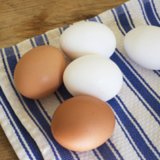
Chock-full of protein, eggs are a quick and easy way to get this essential nutrient anytime of the day. From omelets in the morning to quiche at night, you may be shying away from the yolks to save calories and cholesterol. The yolk may contain all the fat, but it also contains most of the vitamins and nutrients. Take a look at the comparison below to see what you may be missing when you only eat the whites.
| 1 egg white | 1 egg yolk | 1 whole egg | |
|---|---|---|---|
| Calories | 16 | 54 | 71 |
| Total fat (g) | 0 | 5 | 5 |
| Saturated fat (g) | 0 | 2 | 2 |
| Cholesterol (mg) | 0 | 211 | 211 |
| Sodium (mg) | 55 | 8 | 70 |
| Carbs (g) | 0 | 1 | 0 |
| Fiber (g) | 0 | 0 | 0 |
| Sugars (g) | 0 | 0 | 0 |
| Protein (g) | 4 | 3 | 6 |
| Vitamin A (IU) | 0 | 244 | 244 |
| Vitamin B12 (mcg) | 0 | 0.3 | 0.6 |
| Vitamin D (IU) | 0 | 18.2 | 17.5 |
| Calcium (mg) | 2.3 | 21.9 | 26.5 |
| Folate (mcg) | 1.3 | 24.8 | 23.5 |
| Potassium (g) | 53.8 | 18.5 | 67 |
| Selenium (mcg) | 6.6 | 9.5 | 15.8 |
| Omega-3s (mg) | 0 | 38.8 | 37 |
The yolks are where it’s at if you’re looking to up your intake of vitamins A, B12, and D, as well as your daily calcium, folate, and omega-3s. If it’s cholesterol you’re worried about, the recommended limit is about 300 mg a day. That means you could enjoy an egg a day if you wanted to, but it’s important to be mindful about how much meat, cheese, and other dairy products you eat during the rest of the day.
Source: Pop Sugar

